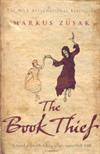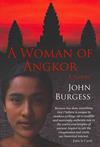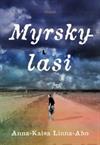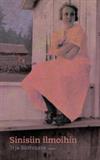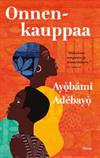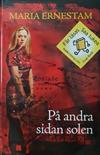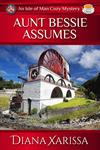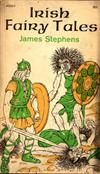
Irish Fairy Tales
1 journaler for this copy...
James Stephens' 1920 work is still pretty popular, especially accompanied by Arthur Rackham's frilly illustrations. Mercifully, the small paperback edition I own lacks illustrations. It's mostly ancient hero tales. And what a prose style the guy has! Wordy but wonderful. I can't refrain from quoting at length from "The Story of Tuan Mac Cairill":
Then I grew old, and in my Ulster cave close to the sea I dreamed my dream, and in it I became a salmon. The green tides of Ocean rose over me and my dream, so that I drowned in the sea and did not die, for I awoke in deep waters, and I was that which I dreamed.
I had been a man, a stag, a boar, a bird, and now I was a fish. In all my changes I had joy and fulness of life. But in the water joy lay deeper, life pulsed deeper. For on land or air there is always something excessive and hindering; as arms that swing at the sides of a man, and which the mind must remember. The stag has legs to be tucked away for sleep, and untucked for movement; and the bird has wings that must be folded and pecked and cared for. But the fish has but one piece from his nose to his tail. He is complete, single, and unencumbered. He turns in one turn, and goes up and down and round in one sole movement.
How I flew through the soft element: how I joyed in the country where there is no harshness: in the element which upholds and gives way; which caresses and lets go, and will not let you fall. For man may stumble in a furrow; the stag tumble from a cliff; the hawk, wing-weary and beaten, with darkness around him and the storm behind, may dash his brains against a tree. But the home of the salmon is his delight, and the sea guards all her creatures.
I became the king of the salmon, and, with my multitudes, I ranged on the tides of the world. Green and purple distances were under me: green and gold the sunlit regions above. In these latitudes I moved through a world of amber, myself amber and gold; in those others, in a sparkle of lucent blue, I curved, lit like a living jewel: and in these again, through dusks of ebony all mazed with silver, I shot and shone, the wonder of the sea.
I saw the monsters of the uttermost ocean go heaving by; and the long lithe brutes that are toothed to their tails: and below, where gloom dipped down on gloom, vast, livid tangles that coiled and uncoiled, and lapsed down steeps and hells of the sea where even the salmon could not go.
I knew the sea. I knew the secret caves where ocean roars to ocean; the floods that are icy cold, from which the nose of a salmon leaps back as at a sting; and the warm streams in which we rocked and dozed and were carried forward without motion. I swam on the outermost rim of the great world, where nothing was but the sea and the sky and the salmon; where even the wind was silent, and the water was clear as clean grey rock.
And then, far away in the sea, I remembered Ulster, and there came on me an instant, uncontrollable anguish to be there. I turned, and through days and nights I swam tirelessly, jubilantly; with terror wakening in me, too, and a whisper through my being that I must reach Ireland or die.
I fought my way to Ulster from the sea.
Ah, how that end of the journey was hard! A sickness was racking in every one of my bones, a languor and weariness creeping through my every fibre and muscle. The waves held me back and held me back; the soft waters seemed to have grown hard; and it was as though I were urging through a rock as I strained towards Ulster from the sea.
So tired I was! I could have loosened my frame and been swept away; I could have slept and been drifted and wafted away; swinging on grey-green billows that had turned from the land and were heaving and mounting and surging to the far blue water.
Only the unconquerable heart of the salmon could brave that end of toil. The sound of the rivers of Ireland racing down to the sea came to me in the last numb effort: the love of Ireland bore me up: the gods of the rivers trod to me in the white-curled breakers, so that I left the sea at long, long last; and I lay in sweet water in the curve of a crannied rock, exhausted, three parts dead, triumphant.
This is not the end of the story of the salmon; if you can find a copy of the book, I urge you to read the rest!
Then I grew old, and in my Ulster cave close to the sea I dreamed my dream, and in it I became a salmon. The green tides of Ocean rose over me and my dream, so that I drowned in the sea and did not die, for I awoke in deep waters, and I was that which I dreamed.
I had been a man, a stag, a boar, a bird, and now I was a fish. In all my changes I had joy and fulness of life. But in the water joy lay deeper, life pulsed deeper. For on land or air there is always something excessive and hindering; as arms that swing at the sides of a man, and which the mind must remember. The stag has legs to be tucked away for sleep, and untucked for movement; and the bird has wings that must be folded and pecked and cared for. But the fish has but one piece from his nose to his tail. He is complete, single, and unencumbered. He turns in one turn, and goes up and down and round in one sole movement.
How I flew through the soft element: how I joyed in the country where there is no harshness: in the element which upholds and gives way; which caresses and lets go, and will not let you fall. For man may stumble in a furrow; the stag tumble from a cliff; the hawk, wing-weary and beaten, with darkness around him and the storm behind, may dash his brains against a tree. But the home of the salmon is his delight, and the sea guards all her creatures.
I became the king of the salmon, and, with my multitudes, I ranged on the tides of the world. Green and purple distances were under me: green and gold the sunlit regions above. In these latitudes I moved through a world of amber, myself amber and gold; in those others, in a sparkle of lucent blue, I curved, lit like a living jewel: and in these again, through dusks of ebony all mazed with silver, I shot and shone, the wonder of the sea.
I saw the monsters of the uttermost ocean go heaving by; and the long lithe brutes that are toothed to their tails: and below, where gloom dipped down on gloom, vast, livid tangles that coiled and uncoiled, and lapsed down steeps and hells of the sea where even the salmon could not go.
I knew the sea. I knew the secret caves where ocean roars to ocean; the floods that are icy cold, from which the nose of a salmon leaps back as at a sting; and the warm streams in which we rocked and dozed and were carried forward without motion. I swam on the outermost rim of the great world, where nothing was but the sea and the sky and the salmon; where even the wind was silent, and the water was clear as clean grey rock.
And then, far away in the sea, I remembered Ulster, and there came on me an instant, uncontrollable anguish to be there. I turned, and through days and nights I swam tirelessly, jubilantly; with terror wakening in me, too, and a whisper through my being that I must reach Ireland or die.
I fought my way to Ulster from the sea.
Ah, how that end of the journey was hard! A sickness was racking in every one of my bones, a languor and weariness creeping through my every fibre and muscle. The waves held me back and held me back; the soft waters seemed to have grown hard; and it was as though I were urging through a rock as I strained towards Ulster from the sea.
So tired I was! I could have loosened my frame and been swept away; I could have slept and been drifted and wafted away; swinging on grey-green billows that had turned from the land and were heaving and mounting and surging to the far blue water.
Only the unconquerable heart of the salmon could brave that end of toil. The sound of the rivers of Ireland racing down to the sea came to me in the last numb effort: the love of Ireland bore me up: the gods of the rivers trod to me in the white-curled breakers, so that I left the sea at long, long last; and I lay in sweet water in the curve of a crannied rock, exhausted, three parts dead, triumphant.
This is not the end of the story of the salmon; if you can find a copy of the book, I urge you to read the rest!
Yes, it's the extravagance of language and invention that makes these stories so attractive. Written for children, perhaps, but not infantilized much, and miraculously never crossing the line from whimsy to cutesiness. They're based on the "Fenian lays", the recitation of which was a popular art form until the 19th century. How I wish I could have heard (and understood) such a performance.



